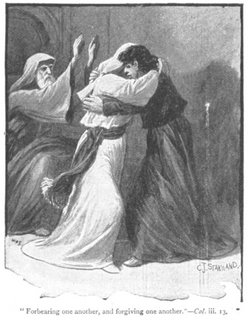
Tuesday in the 3rd Week of Lent
Mt 18:21-35
If we really read the Bible, we know that forgiveness is a perennial theme. The Bible-story is a love story, clearly marked by a history of forgiveness. While God, in His faithful love, did everything for His people (cf Is 5:4), His people kept on prostituting themselves to false gods, ultimately to evil. God, however, is unbelievably so tenderhearted and mercy is His greatest attribute. Thus, countless times God forgave His people whenever they would return to Him. Madly in loved with His people, God finally sent them His own Son, not to count their transgressions against them, but so that He may reconcile them to Himself in Christ, His Son (cf 2 Cor 5:19). But still, His people rejected and crucified God’s own Son. Yet, on the cross, echoed the words of the dying Son of God: “Father, forgive them; for they do not know what they do.”
Today, Jesus turns our attention to the basic point of our lives as His followers: the model of our relationship with our fellow human being is God’s relationship with us. We ought to be merciful to others as God is ever merciful to us. Just as God forgives us so should we forgive others. Our relationship with our fellow human being should flow from God’s goodness to us.
So that we relate with others the way God relates with us, we must never forget how God deals with us. We must always remember how merciful God is to us. We must not forget that we ourselves have been forgiven by God countless times and are still forgiven each time we ask for His mercy.
Each day, let us learn more and more to practice what we pray in the Lord’s Prayer, “Forgive us our sins as we forgive those who sin against us.” Let the Bible-story continue in our lives. Let our lives be love stories, clearly marked by a history of forgiveness, between not only God and each one of us but also between our selves and everyone. Let us forgive from our hearts. Let the Bible be written in our hearts.
Mt 18:21-35
If we really read the Bible, we know that forgiveness is a perennial theme. The Bible-story is a love story, clearly marked by a history of forgiveness. While God, in His faithful love, did everything for His people (cf Is 5:4), His people kept on prostituting themselves to false gods, ultimately to evil. God, however, is unbelievably so tenderhearted and mercy is His greatest attribute. Thus, countless times God forgave His people whenever they would return to Him. Madly in loved with His people, God finally sent them His own Son, not to count their transgressions against them, but so that He may reconcile them to Himself in Christ, His Son (cf 2 Cor 5:19). But still, His people rejected and crucified God’s own Son. Yet, on the cross, echoed the words of the dying Son of God: “Father, forgive them; for they do not know what they do.”
Today, Jesus turns our attention to the basic point of our lives as His followers: the model of our relationship with our fellow human being is God’s relationship with us. We ought to be merciful to others as God is ever merciful to us. Just as God forgives us so should we forgive others. Our relationship with our fellow human being should flow from God’s goodness to us.
So that we relate with others the way God relates with us, we must never forget how God deals with us. We must always remember how merciful God is to us. We must not forget that we ourselves have been forgiven by God countless times and are still forgiven each time we ask for His mercy.
Each day, let us learn more and more to practice what we pray in the Lord’s Prayer, “Forgive us our sins as we forgive those who sin against us.” Let the Bible-story continue in our lives. Let our lives be love stories, clearly marked by a history of forgiveness, between not only God and each one of us but also between our selves and everyone. Let us forgive from our hearts. Let the Bible be written in our hearts.
No comments:
Post a Comment